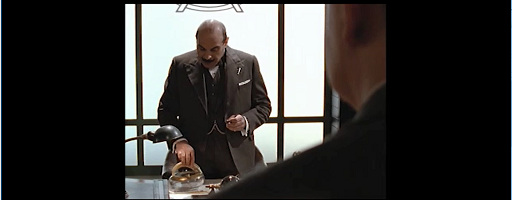6 Adaptation and The Murder of Roger Ackroyd
With the development of cinema in the 1930s and 40s and later the arrival of television, the whodunnit, alongside other subgenres of crime fiction, found new mass media forms. Not all literary genres lend themselves to adaptation, but with their suspenseful plotting, and their dramatic emphasis on character and narrative and (often visual) clues, detective fictions such as Christie’s seemed almost perfectly designed for the big, and small, screen. If you live in the UK, you will be aware of the numerous adaptations of Agatha Christie’s detective fictions that are almost a fixture of UK TV programming, and in the final section of this course, you will look at one of these adaptations from ITV’s series Agatha Christie’s Poirot (1989–2013).
Activity 2
Watch this clip from ‘The Murder of Roger Ackroyd’, adapted for the long-running and highly acclaimed ITV series, Agatha Christie’s Poirot (1989–2013), starring David Suchet. Then, answer the questions that follow.

Transcript
HERCULE POIROT: But before I reveal my secret, you must both expound your theories to me. And let us commence with you, James.
JAMES SHEPPARD: Me? Oh no. I can’t show myself up in front of the professionals.
CAROLINE SHEPPARD: I got so fed up with waiting in the car. Are you going to be much longer, James?
JAMES JAPP: JAMES: No. No. Maybe I ought to call it a day.
HERCULE POIROT: No, my dear James. Madame, your brother was just going to tell us his theories about the murderer. Please do come and sit.
CAROLINE SHEPPARD: Well, yes. Yes, of course.
HERCULE POIROT: Merci. So James, tell us what sort of man or woman are we looking for?
JAMES SHEPPARD: Woman? Well, I hardly think it could be a woman.
HERCULE POIROT: And this man, was he also do you think the blackmailer?
JAMES SHEPPARD: Oh, I think he probably had some sort of financial arrangement with Mrs. Ferrars. Yes. Somehow, certainly, he became aware the true cause of Ashley Ferrars’ death. He could even be a detective.
HERCULE POIROT: But perhaps, as a doctor, you would have been also situated most ideal in this part.
JAMES SHEPPARD: Oh, ideally. But the important moment in this case is not the murder of Ashley Ferrars, but the suicide of his widow. Her motives remain unclear. But for whatever reason, she decided to end her life.
Now, this must have placed our murderer in something of a quandary. He knew about her rather distasteful affair with Roger Ackroyd. His difficulty was in knowing whether before she died she had confided in him the identity of the man with whom she had the financial arrangement.
JAMES JAPP: You mean the blackmailer.
JAMES SHEPPARD: This was hardly some common blackmailer, Chief Inspector. He probably saw Roger Ackroyd somewhere around this time, and something in Ackroyd’s manner made him wonder. And in that moment, he decided he could not take a chance.
He was certainly capable of constructing some sort of device to turn a Dictaphone on and off at any time he chose. I don’t imagine he left the choice of weapon as much to chance as it would appear. I believe he had a weapon with him already, when it occurred to him that the dagger which was actually on display at the scene of the crime would cast the net of suspicion even wider. He was already to perform the killing when he had confirmation of his deepest fear.
PARKER: Evening post, sir.
JAMES SHEPPARD: Mrs. Ferrars had indeed confided in Ackroyd, but not in person. She had written him a letter. And Ackroyd opened that letter in his presence and started to read it.
ROGER ACKROYD: My dear. My very dear Roger. I would not tell you the name this afternoon. But I propose to write it to you now. I’m sorry, but I must read this on my own.
JAMES SHEPPARD: At least tell me the name of the man.
ROGER ACKROYD: No, no. I must read it on my own.
JAMES SHEPPARD: Very well.
[GURGLING SCREAM]
HERCULE POIROT: And in that letter, Madame Ferrars had named the blackmailer, had she not?
CAROLINE SHEPPARD: I’ve been reading this book I found in the car, James.
JAMES SHEPPARD: It wasn’t blackmail.
CAROLINE SHEPPARD: Don’t say anymore, James.
HERCULE POIROT: Oh, come now, James. The man had bled Madame Ferrars white.
JAMES SHEPPARD: Dorothy Ferrars was an adulterous, murdering bitch. She lauded it over us. All the money she had, she never worked for it. Nor did her drunk of her husband before her. They were idle, useless persons.
CAROLINE SHEPPARD: Stop it, James.
JAMES SHEPPARD: No! They didn’t know what it was like scrimping and saving year after year, never able to afford a holiday. On call day and night to every idiot with a bilious attack for miles around. You’ve no right to stand in judgement on me.
Blackmail? You call it blackmail? The law wouldn't punish her, would they? So I did.
[SIGHS] Well, there you are. I’ve done your work for you. Sorry, Carol.
- How successful are the screen writers in adapting a supposedly un-adaptable novel for the small screen, based on this scene and their handling of the killer’s revelation?
- What decisions might they have made differently, in terms of structure, form and characterisation?
- How essential are the period-specific features, as represented in Agatha Christie’s Poirot?
- Can you envisage this story set in a different period or setting? Suggest one possible scenario using a different historical context.
